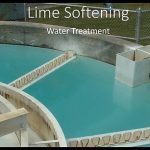Q. What is hardness of water? Describe Zeolite process for making soft water from hard water.
Ans: Hardness is defined as the soap consuming capacity of a water sample. Generally, soaps consist of the sodium salts of long fatty acids (such as oleic acid, palmic acid and stearic acid). The soap consuming capacity of a water largely due to the presence of Ca+2 and Mg+2 ions as they form insoluble scums of calcium and magnesium soaps which do not have any detergent value.
For softening of water by zeolite process, hard water is percolated at a specified rate through a bed of zeolite. Zeolite holds sodium ion loosely and can be represented as Na2Z, where Z represents insoluble radical frame work.
When the water passes through the zeolite the hardness causing ions (Ca+2, Mg+2 etc.) are retained by the zeolite as CaZ and MgZ respectively, while the outgoing water contains equivalent amount of sodium salts. The block diagram and chemical reactions taking place in zeolite softener are:
 After some time, when the zeolite is completely changed into calcium and magnesium zeolites, then it gets exhausted (saturated with Ca+2 and Mg+2 ions) and it ceases to soften water. It can be regenerated and reused by treating it with a 10% brine (sodium chloride) solution.
After some time, when the zeolite is completely changed into calcium and magnesium zeolites, then it gets exhausted (saturated with Ca+2 and Mg+2 ions) and it ceases to soften water. It can be regenerated and reused by treating it with a 10% brine (sodium chloride) solution.
CaZ + 2NaCl ® Na2Z+ CaCl2
MgZ + 2NaCl ® Na2Z+ MgCl2
Q. Compare the merits and demerits of ion exchange process and zeolite process used for water softening.
Ans:
Merits of ion-exchange process:
Ø The process can be used to soften highly acidic or alkaline water.
Ø It produces water of very low hardness (say 2ppm).
Ø It is very good for treating water for use in high-pressure boiler.
Demerits of ion-exchange process:
· The equipment is costly and more expensive chemicals are needed.
· If water contains turbidity, then the output of the process is reduced
· Turbidity must be below 10 ppm. If it is more, it has to be removed first by coagulation and filtration.
Merits of Zeolite Process:
· It removes the hardness almost completely (about 10 ppm hardness only).
· The process automatically adjust itself for variation in hardness of incoming water.
· This process does not involve any type of precipitation, thus, no problem of sludge formation occurs.
Demerits of Zeolite Process:
· The outgoing water (treated water) contains more sodium salts.
· This method only replaces Ca+2 and Mg+2 ions by Na+ ions.
· High turbidity water cannot be softened efficiently by zeolite process.


